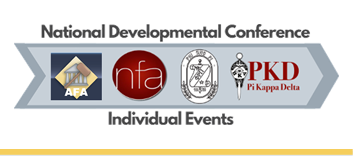Document Type
Role of Director of Forensics
Abstract
Much has been written regarding pressures facing directors of forensics and forensic educators in general. Most of these pressures are associated with managing a slate of professional responsibilities that exceed those of most professional educators, along with balancing professional and personal lives. While much attention has been paid to the role of the director of forensics as an educator, colleague, and mentor, less has been written regarding the director as a manager of professional colleagues. Similarly, little discussion is found within forensic scholarship regarding the challenges and opportunities associated with multiple staff members within a single forensic program.
We advocate a collaborative team approach to directing the forensic program. Our paper addresses the rationale for such an approach, justifying assistants as a means of improving programs and enhancing lives of the professionals leading those programs. We also detail one model for collaborative administration that has, on balance, worked to attain and exceed university and program goals. Finally, the paper outlines particular issues associated with collaborative administration and strategies for responding to such issues. In the end, we advocate a collaborative team approach to directing forensic programs as an excellent means of maximizing the potential of forensic students and professionals.
Creative Commons License

This work is licensed under a Creative Commons Attribution 4.0 International License.
Rights Statement
In Copyright https://rightsstatements.org/page/InC/1.0/?language=en
Recommended Citation
Jensen, Scott; Jensen, Gina; and Serfass, Thomas
(2008)
"Finding Strength in Numbers: A Collaborative Team Approach to Directing Forensic Programs,"
Proceedings of the National Developmental Conference on Individual Events: Vol. 4:
Iss.
1, Article 6.
Available at:
https://cornerstone.lib.mnsu.edu/ndcieproceedings/vol4/iss1/6

